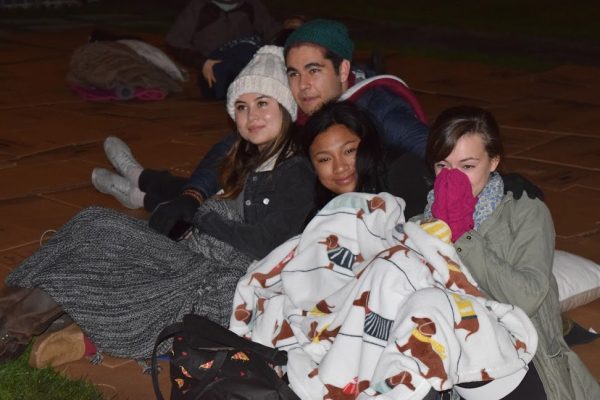Students Sleep Out for Change
Students bundle up on mats of cardboard to sleep overnight on the plaza. (JON BJORNSON JR/THE FORDHAM OBSERVER)
November 15, 2016
Flattened cardboard boxes covered a large part of the outdoor plaza of Fordham College at Lincoln Center (FCLC) on Nov. 7, where students and staff met overnight for the Sleep-OUT 4 Change. This event included a facilitated discussion and experience of the struggles and stigma of homelessness.
This final event of Campus Ministry’s Ignatian Week was organized by Residential Life and staffed by members of the office, and was adapted from similar sessions held at schools across the country. Over 30 people attended as they sat wrapped in coats and blankets on the cardboard in 45-degree weather well into the night.
Assistant Dean for Freshmen at FCLC Joseph B. Desciak, Ph.D., spoke, as well as a panel of individuals who have worked professionally with the homeless. This included former FCLC Residential Director Lindy Emerson Desciak, Lynden Bond of the Coalition for the Homeless, Nova Lucero of the Metropolitan Council on Housing and Renee Best from Henry Street Settlement.
Assistant Dean Desciak addressed the gathering, speaking of the Jesuit value of cura personalis, which lies at the heart of Fordham University’s approach to student life. He emphasized how in the case of caring for a homeless person, this idea of caring for the whole person requires eye-to-eye recognition, which is unusual in our society.
The panel spoke about their experiences with homelessness through their work, and answered questions from the crowd. They discussed the impact of social media on public engagement with the homeless, as well as the difficulties of navigating their personal lives when their professional work is so consuming.
The last question of the night came from a student who did not identify himself by name, but revealed that he had been homeless for five and a half months, and had struggled to find a shelter and a way back to stability.
“I see a lot of homeless people on the street sometimes and I always want to help them, tell them where the shelters are,” he said. “But I was wondering, what are the first actions you should take if you do become homeless so you will find a shelter and you will find help as soon as possible?”
Lucero informed the crowd that as a single adult, an individual has a right to shelter, regardless of documentation. “The work that I actually do is we go out at 12 a.m., we go out at 2 [o’clock] in the morning to make sure that every person who wants a bed has a bed. So know that you have a right to two sheets and a blanket and a pillow, a toothbrush and warm water and meals, and someone to act as a case manager to help you get off the streets.”
She also acknowledged that many have had negative experiences in shelters, so there might be reasons that some homeless individuals do not seek them.
Best added that the intake process for families is “almost punitive.” She said, “I’m not sure why anybody would fake like they’re homeless to be in a shelter, but the system is set up to weed out those who are faking their homeless situation.” For example, individuals must submit a ten-year housing history when they enter.
But, she said, for domestic violence victims it is very easy to secure shelter. Best recommended that those who find themselves in that situation call 1-800-Safe-Horizons or contact her workplace, Henry Street Settlement.
Frank McAlpin, Residential Director for First Year Students closed the night, saying, “I think it’s so critical to do these kinds of events and to engage in social justice work in this way. This is exactly why I came back to Fordham and exactly why you attend a Jesuit University. You attended to be engaged with yourself and others in the community and to create change.”
Rose Lyn, FCLC ‘17, said that although she was not planning to sleep out due to recent illness, she was happy to have helped organize the event. “We as Fordham students experience so much privilege and basically most of us are getting it paid for by our parents,” she said. “Just outside of our small community are so many people who are experiencing homelessness that we just kind of walk by on a day-to-day basis without paying attention to it.”
Lyn recalled a habit she had recently gotten into after advice from a friend. “I have an unlimited Starbucks card that my mom refills,” she explained. “When I see homeless people standing or sleeping by the [Starbucks] at Columbus Circle, I’ll be like ‘do you want a hot chocolate?’ It’s the cheapest thing on the menu, and even though I know I don’t have a lot, I know I can at least bring someone something. It’s small things like that where you don’t feel like you’re making that much of a difference but it might make a big difference to them.”
Aakash Kumar, FCLC ‘17, did plan to sleep out, and said, “I think the most important thing to take away from this is learning from the homeless, what they’re going through and what hardships they’re facing. When you think you’re educating them, they’re most likely educating you.”
Before students slept, the gathering was treated to foil-wrapped grilled cheese sandwiches and encouraged to make conversation about what they had learned, and reflect on the experience.










